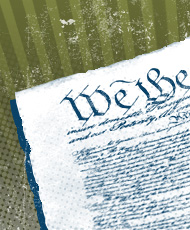
The events of last weekend are tragic in so many ways, on so many different levels. The ACLU grieves deeply with the rest of the nation for all who were killed or injured in this senseless attack on Congresswoman Gabrielle Giffords and others, and we wish a full recovery for all the wounded who are still struggling. There is no place for such violence in our democracy.
As Director of the Washington Legislative Office, I am struck by this tragedy in some very particular ways. As a lobbyist who loves working with Congress, I feel a personal connection to the helpless, angry and fearful feelings many members and their staffs are now experiencing. They work very hard to get heard by their constituents and sometimes tolerate a great deal of vulnerability and anxiety to engage in the passionate debates that are essential to our vibrant democracy.
At the same time, the ACLU has another concern — that in the midst of an emotional response to this horrific event, Congress, reasonably concerned about the heated and sometimes violent rhetoric in recent politics, might instinctively react by seeking to enact legislation, as some have proposed, that chips away at our fundamental speech rights. Doing so would only compound the tragedy already besetting the nation.
Unfortunately, some of the legislation reportedly being considered for introduction seeks to criminalize types of expression that are protected by the First Amendment. While these efforts are likely well-intentioned, they could in fact be unconstitutional and have the effect of chilling lawful political speech that is so critical to our free society. Congress should not take that path. Our government already has more than enough authority to investigate and prosecute threats of violence or incitements to criminal behavior.
As a former Capitol Hill staffer and legislative assistant to late Rep. Parren Mitchell and Rep. Shirley Chisholm, I helped organize “meet and greets,” town hall meetings and open houses in some of the roughest sections of Baltimore, Maryland, and Brooklyn, New York, and I know the drill. You worry about whether the event is well-planned, whether the member of Congress will arrive on time, and whether he or she has been fully briefed on all the relevant issues. You wonder how many people will show up, and if the venue is too small or too big. And sometimes, especially in heated political environments, you think about whether the crowd will be rancorous and whether things might get out of control.
I was doing this work in the late 70’s, in the aftermath of major civil rights riots and upheavals. Americans were angry and scared about the direction of the nation for all different reasons, and emerging women’s and civil rights legislation was at the forefront. It was not uncommon for public officials to get hate mail and death threats. Today, too, people are angry and scared for a whole host of reasons — the economy, immigration, war, terrorism and health care, to name just a handful. Just last spring during the health care debates, members of Congress were jeered and spat upon on their way to cast votes on health care reform legislation. At that time, the ACLU met with Capitol Hill police about the importance of safeguarding free speech while prosecuting illegal actions. Given the very real security issues, leaders like Rep. Giffords and her staff demonstrate a lot of courage when they routinely plunge into the fray in the fine tradition of maintaining direct contact with constituents.
The motive for the Arizona shooting is still not known and might never be known. But regardless of the cause, many opinion leaders, activists, elected officials and everyday citizens are now engaging in a serious conversation about the repercussions of speech that calls for violence or uses violent metaphors. That conversation must include — as it fortunately has — the need to defend constitutionally protected speech. Mild speech is easy to ignore, but it is in the hard cases that our adherence to the First Amendment is most important.
With all this in mind, it is important to remember that while the First Amendment carefully guards our liberty to speak freely except in the most circumscribed situations, it is not a barrier to effective law enforcement against those reasonably believed to be involved in unlawful activity. The ACLU has engaged with Congress in the past to advise its members on ways they can protect the First Amendment while protecting themselves. We have done so again today by sending a memo on the topic to Congress.
In times like these, it is natural to look for ways to quell our horror and fear. But it is when people feel most vulnerable that our liberties are most at risk. Unraveling the principles that form the core of our democracy is not the answer.

